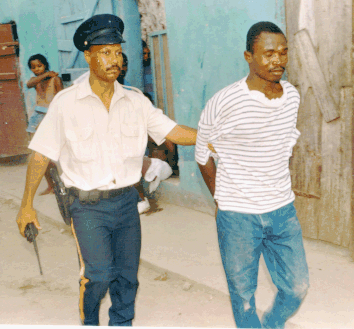Haiti Insight Volume 7, No. 3 William G. O'Neill, New York, NY William G. O'Neill, New York, NY
The Haitian National Police: A Mixed Record
An investigation into human rights abuses committed
by Haitian National Police (HNP) officers and the efforts made by HNP's top leadership to
punish and prevent such violations are part of a report released Jan. 22 by Human Rights
Watch/Americas, the Washington Office on Latin America and NCHR.
The 40-page report, entitled "The Human Rights Record of the Haitian National Police,"
reaffirms that creating a police force that respects and protects human rights is not only
central to the rule of law, but also essential to Haiti's struggle to implement a full
transition from dictatorship to democracy.
The three human rights organizations investigated
cases where HNP officers had killed civilians in circumstances where the police could not
legitimately claim that they were acting in self-defense. The report also documents cases
of torture and mistreatment of detainees based on numerous interviews with the person who
was tortured or mistreated, HNP officers and witnesses.
These violations -- combined with lesser offenses
like abusing authority, stealing police property, reporting late for work and damaging
police vehicles -- undermine the HNP's efforts to create a rights-respecting police force
that Haitian citizens can respect as a professional national law enforcement organization.
The report makes clear, however, for the first time
in Haitian history, HNP leadership has acted to punish officers who violate the law and
the human rights of citizens. The Inspector General's office has disciplined dozens of
officers and has fired over 50 from the department. Thirteen officers are now awaiting
trial on murder charges. The Inspector General has also suspended, transferred and docked
the pay of officers who have violated police rules of conduct.
While laudable, the report notes that more needs to
be done, including providing more personnel and resources to the Inspector General's
office, and jump-starting Haiti's notoriously corrupt and ineffective legal system so that
police officers who violate the law are prosecuted and punished.
The report analyzes the various causes of police
misconduct, including lax oversight of police behavior during the first year of the HNP's
existence from mid-1995 to mid-1996. The HNP suffered from an extremely hasty initial
training period of four months, severe shortages in basic police equipment (including
vehicles, radio communications and defensive equipment like shields and bullet-proof
vests) and the virtual absence of trained and experienced commanding officers in the
field.
Taken together, these factors partly explain some of
the HNP's abusive behavior. For example, poorly trained and equipped officers with no
experience and ineffective field leadership sometimes panicked when faced with
circumstances like non-violent demonstrations. They resorted too quickly to their
firearms, and avoidable death and injury followed (in other cases, officers acted in
complete disregard of Haitian and international law, and the only acceptable response is
disciplinary action and possible prosecution).
The HNP, with vital assistance from international
donors, has started to address the force's deficiencies. For example, the U.S. Department
of Justice's International Criminal Investigation Training Assistance Program (ICITAP)
provided supplemental training to HNP officers in the legal use of force and firearms
during the summer of 1996. In another development in mid-1996, France trained a special
HNP crowd control unit. This unit successfully observed -- and helped keep peaceful --
several demonstrations in late 1996, but their hasty and apparently unjustified use of
tear-gas during a peaceful march in mid-January led to one demonstrator losing his hand
after he grabbed a tear gas grenade. This incident underscored the need for on-going
training and close oversight.
Other assistance includes the United Nations
International Civilian Police (CIVPOL), who work in station houses with the HNP, and
sometimes go on patrol with the officers. CIVPOL officers can also pass on valuable on the
job training and advice. Also, the UN/Organization of American States International
Civilian Mission in Haiti (MICIVIH) has sent members of its legal team to help train
officers in human rights principles. One shortcoming the report highlights is the
reticence of some CIVPOL officers to monitor or critique the human rights performance of
the HNP, leaving this area to MICIVIH. The report criticizes this tendency, and
underscores how CIVPOL are often ideally placed to observe the HNP and to provide timely
assessments of their work.
Haitians have never experienced a police force that
worked to protect them from crime. Security forces in the past have killed, tortured,
beaten and extorted money from the people they were supposed to serve. Because of this
historical record, the report describes the importance of public education programs to
explain to Haitians how the HNP needs their help and cooperation to prevent crime and
protect lives and property. The HNP, in turn, needs to earn the population's trust by
observing human rights norms and punishing officers who flout them. Another important
strategy in the campaign to create a healthy relationship between the police and the
population involves extensive police participation in community activities. The report
notes the success of several community policing initiatives where HNP officers visit
schools, sponsor local sporting events, participate in community development projects and
meet regularly with community groups.
NCHR, Human Rights Watch/Americas and WOLA make
numerous recommendations in the report, including:
The HNP must establish a policy of zero tolerance
for abuse, and aggressively prosecute police who torture, kill or commit other human
rights violations.
Police authorities must provide the inspector
general with all the necessary resources to conduct thorough investigations, vigorously
apply appropriate disciplinary measures and facilitate the ability of citizens to file
complaints of police abuse.
The Ministry of Justice must insist that judicial
authorities actively pursue investigations of police abuse.
Police authorities must make information available
to the public on cases of abuse, and describe disciplinary measures taken against police
officers in response to citizen complaints.
The international community and Haitian police
authorities must continue to work together to strengthen police leadership and training,
improve logistical capabilities and emphasize the importance of respect for human rights.
The Haitian government and police authorities
should work with non-governmental and local organizations to improve the understanding
among the general public of the police's role and how to enhance community relations.
Public education campaigns should also emphasize the mechanisms available for making
complaints of police abuse.
To download the report, click on this link now: The Human Rights Record of the Haitian National Police .
|